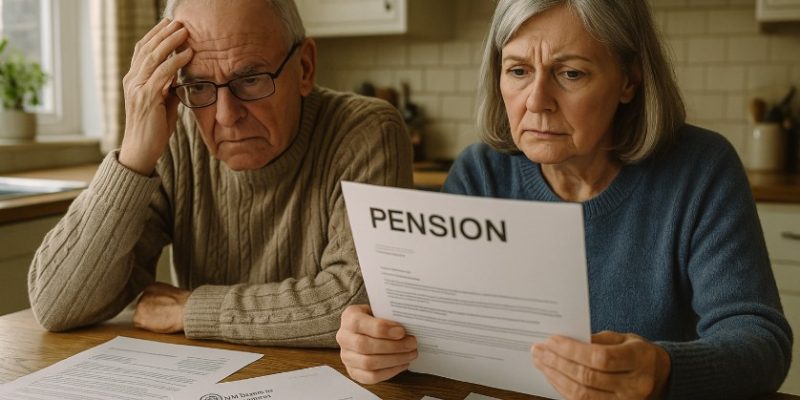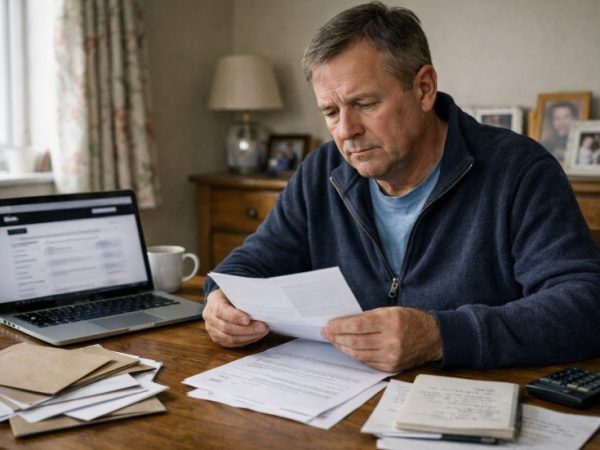
HMRC Pension Savers Lump Sum Shock as Crackdown Triggers 70% Tax Bills for Retirees
In a move that has left many UK retirees facing unexpected financial hardship, HM Revenue and Customs (HMRC) has begun issuing tax penalties as high as 70% on what were previously considered tax-free pension lump sums.
This sudden crackdown has sparked widespread concern and confusion among pension savers who attempted to return withdrawn funds, only to discover that such refunds are now categorised as “unauthorised payments” under HMRC’s revised rules.
This article explores the recent policy enforcement, its implications for pension savers, and the broader impact on retirement planning in the UK.
What Has Triggered the HMRC Crackdown on Pension Lump Sum Returns?

The sudden crackdown by HMRC on returned pension lump sums has been prompted by a dramatic rise in early pension withdrawals.
This behaviour was primarily driven by fears that the newly appointed government, particularly under Chancellor Rachel Reeves, would reduce the tax-free lump sum threshold.
Rumours circulated suggesting a cut from the existing £268,275 to as low as £100,000.
Many pensioners, especially those nearing retirement or recently retired, acted quickly to take advantage of the current tax-free withdrawal limits.
The anticipation of losing this financial benefit caused a spike in lump sum withdrawals, resulting in £20 billion more being taken from pensions in the 2024–25 tax year than the previous year.
Of that, £18 billion accounted for tax-free lump sums, representing a 63% increase.
These rapid withdrawals were then followed by attempts to reverse the transactions.
Some individuals either regretted the decision, did not require the money, or misunderstood the rules surrounding withdrawal rights.
However, HMRC’s interpretation of pension law meant that returning the money to a pension pot qualified as a breach of tax regulations, particularly under pension recycling rules.
Why Are Pension Lump Sum Refunds Now Being Taxed as Unauthorised Payments?
HMRC has labelled the act of returning withdrawn tax-free lump sums as an “unauthorised payment” under pension legislation.
While some financial products offer a cancellation period, pensions operate under distinct rules governed by tax law.
Pension recycling refers to withdrawing tax-free cash and then reinvesting it into a pension to gain further tax advantages.
HMRC has strict conditions to prevent this, especially when the reinvestment could result in an individual receiving extra tax relief they wouldn’t otherwise be entitled to.
Even if the returned money was not intended for recycling purposes, HMRC applies a blanket interpretation when the returned funds meet any of the following conditions:
- The contribution is made shortly after a tax-free lump sum withdrawal
- The amount is significantly larger than previous annual contributions
- There is an apparent connection between the withdrawal and the subsequent contribution
This means that individuals acting within days of the original withdrawal, perhaps thinking they had a 30-day window to change their minds, were caught off guard.
Financial Conduct Authority (FCA) regulations may allow a form of contract cancellation, but HMRC has clarified that their tax treatment overrides any such rights when it comes to pensions.
How Severe Are the Tax Penalties for Returning a Tax-Free Lump Sum?

The penalties for what HMRC defines as an unauthorised payment are substantial. Most pension savers can expect to face a tax charge of 55% on the amount returned.
In situations where the pension scheme administrator fails to report or correct the issue properly, an additional scheme sanction charge of 15% can be applied. This brings the total tax liability to as much as 70% of the returned sum.
To illustrate this more clearly, here’s a breakdown:
| Returned Lump Sum | Unauthorised Payment Charge (55%) | Scheme Sanction Charge (15%) | Total Tax Penalty |
| £50,000 | £27,500 | £7,500 | £35,000 |
| £100,000 | £55,000 | £15,000 | £70,000 |
These penalties are financially devastating for retirees who believed they were correcting a mistake or taking advantage of a legitimate cooling-off period.
For some, the tax due is nearly equal to or greater than the amount returned, effectively negating the benefits of the original withdrawal.
What Is the Impact on Pension Savers and Retirees in the UK?
The implications for pension savers are considerable. Many over-55s who accessed their pension pots in good faith are now facing surprise tax bills. These individuals often withdrew funds to:
- Pay off outstanding mortgage balances
- Support children through education
- Make necessary home repairs or adaptations for later life
The expectation was that if circumstances changed, they could reverse the withdrawal. Some were advised by pension providers that refunds were possible within a short timeframe.
These providers often operated under FCA guidance, which includes rights to cancel financial agreements within 14 or 30 days, depending on the product.
The situation is worsened by the fact that HMRC has admitted it does not have a full account of how many savers are affected.
There is no central record of how many people have attempted to return lump sums and fallen foul of the rules.
Pensioners have been left in a legal grey area, unsure whether they can appeal the charge, reclaim the penalty, or take action against providers.
In some cases, providers are also facing scrutiny for promoting the idea that returns were acceptable.
Are Pension Providers at Fault for Allowing Returns Under FCA Rules?
Pension providers find themselves at the centre of the confusion. While some acted cautiously, refusing to accept any refund of tax-free lump sums, others processed such returns based on what they believed to be compliant with FCA regulation.
Aviva, for example, has stated that it does not permit lump sum returns. However, other firms were reportedly telling customers that returning their funds was a “smart financial move,” especially when the government’s policy direction was unclear.
Industry insiders have commented that the mixed messages from regulators have placed both providers and pensioners in difficult positions.
A representative from a major pension firm noted that some providers did not require professional advice before allowing lump sum access.
These providers may now be dealing with more customer complaints or queries than those who mandated advice prior to withdrawals.
This inconsistency in provider policy highlights a larger issue: there is a regulatory disconnect between the rules outlined by the FCA and the tax treatment applied by HMRC.
Do Pension Savers Have Any Rights to Cancel Lump Sum Withdrawals?

Under current HMRC rules, withdrawing a tax-free lump sum from a pension is not considered a cancellable transaction.
Unlike other financial services or investment products that come with a 14- or 30-day cooling-off period, pension withdrawals are final from a tax perspective.
The FCA clarified that any right to cancel depends solely on the terms of the pension provider’s contract with the individual.
Even if a provider allows a refund or cancellation, HMRC will still treat the returned funds as a new contribution, potentially triggering unauthorised payment tax charges.
This puts consumers in a difficult position. They may have been led to believe that cancellation was an option, only to be penalised by HMRC regardless of what their pension contract stated.
How Can Retirees Avoid the Unauthorised Payment Trap?
The best course of action for retirees is to avoid acting impulsively based on speculation or incomplete information. Once a lump sum is withdrawn, the ability to reverse the action without financial consequence is limited.
Retirees should consider the following:
- Always consult a regulated financial adviser before making pension decisions
- Confirm with the provider whether reversal is possible and how it would be treated for tax purposes
- Avoid withdrawing large sums based on unverified political or economic forecasts
- Check how the decision aligns with long-term retirement income needs and tax thresholds
Pension decisions, particularly those involving lump sum withdrawals, should be part of a broader financial plan rather than a response to short-term concerns.
What Are the Long-Term Implications for UK Pension Policy?

The HMRC crackdown may prompt broader discussion around pension policy in the UK, particularly around consumer protection, regulatory consistency, and communication.
Key areas of concern include:
- Lack of alignment between FCA rules and HMRC tax regulations
- Absence of a unified public communication strategy regarding pension withdrawals
- Unclear guidance for both consumers and pension providers
Financial experts have already begun calling for a reassessment of the recycling rules and a clearer, fairer appeals process for those caught out by recent enforcement.
Here is a comparison table showing the contrast in perspectives between the FCA and HMRC:
| Regulatory Body | Stance on Lump Sum Reversal | Governing Rules | Consumer Rights Recognised |
| FCA | Permits cancellation based on contract terms | Financial Conduct Authority (Conduct of Business rules) | Varies by provider |
| HMRC | Treats reversal as unauthorised payment | Finance Act 2004 and pension tax law | No cancellation rights |
Unless clarity is introduced, the risk of more pensioners falling into this tax trap remains high.
Policy reform may be needed to prevent further financial damage and ensure that savers are not punished for making genuine attempts to manage their retirement income responsibly.
Conclusion
The recent developments serve as a stark warning to pension savers: always verify the tax implications of any pension decision before proceeding.
While speculation about government policy may push people to act quickly, doing so without clear guidance or professional advice can have serious financial consequences.
This case also highlights the urgent need for better alignment between tax authorities and financial regulators to protect consumers from being penalised for misunderstandings caused by regulatory ambiguity.
For now, pension savers should proceed with extreme caution and take steps to ensure their retirement decisions are both informed and compliant with HMRC rules.
FAQs About HMRC Pension Lump Sum Tax Penalties
What is considered an unauthorised pension payment by HMRC?
An unauthorised pension payment includes any transaction that breaches pension regulations, such as recycling tax-free lump sums back into a pension scheme. HMRC may apply penalties up to 70%.
Can you reverse a tax-free lump sum pension withdrawal in the UK?
In most cases, no. HMRC treats returned tax-free lump sums as unauthorised payments, making them subject to significant tax penalties, even if reversed quickly.
Why is HMRC applying a 70% tax on some pension returns?
If the returned lump sum meets conditions for “recycling”, it may be taxed as an unauthorised payment. The penalties include a 55% unauthorised payment charge and an additional scheme sanction charge, totalling 70%.
Are pension providers liable for allowing lump sum refunds?
No, but providers that facilitated refunds may have acted under FCA rules. HMRC’s tax stance takes precedence, and providers are not held financially responsible.
How do FCA rules conflict with HMRC’s tax policies?
FCA rules may allow refund rights within contracts, but HMRC tax laws treat pension withdrawals differently. FCA rules do not override tax penalties under pension law.
What should I do before taking a pension lump sum?
Speak with a regulated financial adviser, understand HMRC rules, verify the need for funds, and confirm the implications of reversing the transaction if necessary.
Will HMRC review or amend its pension tax policies in the near future?
Currently, HMRC has only stated it will review individual cases but has shown no indication of policy changes. Industry pressure may prompt future revisions.





